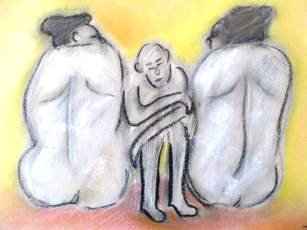A Shameless Review

When I get to the end of certain books I find myself wondering: now if that was me sending that off to an agent or publisher, I would rate my chances along with someone wanting to lose weight on a diet of nothing but fast food.
I believe that someone like J.M. Coetzee has earned a kind of carte blanche when it comes to his writing, especially after winning the Nobel prize for literature. Being established, he can afford to take risks and play around with the whole notion of what we expect from a novel. Other lesser-known writers wouldn't have this luxury.
Slow Man is a perfect example of a novel that starts out as a cosy blanket, but then quickly shakes the reader out of bed! Coetzee is playing. I believe he deliberately wanted to sound the alarm clocks at dawn, regardless of how we all react!
This is the story of Paul Rayment, an elderly man who loses a leg in a cycling accident in Adelaide, Australia. Coming across as someone with a no-nonsense, philosophical approach to life, he refuses a prosthesis and tries his best to make the most of his lot. Not surprisingly, however, he finds it difficult to fend off misery and loneliness. Combined into the mix is his attraction towards his Croatian nurse and an overwhelming desire to help her and her children.
The novel, which only runs to 263 pages, starts in a very traditional way and it is very easy to get hooked into the story. The writing is crisp and light, without the folds of fat that most novels have. Then, just when we're feeling cosy with a non-taxing read, we are in for a bit of mental acrobatics: at page 79 a character from one of Coetzee's previous novels knocks on the door, the Australian novelist Elizabeth Costello. She is drawn as a busybody, urging Paul to change his outlook, make decisions, get a grip. He doesn't want this woman around but she stays anyway, saying that he simply came to her and she has no choice in the matter. We understand that Paul is a character in a book she is writing when she quotes to him the opening lines of Slow Man and asks: "Why do I need this man, why not let him be, coasting along peacefully on his bicycle?"
We are forced to re-evaluate. Is this about an author starting a story and then getting in touch with the protagonist to find out how he ticks and where the plot should go? It seems Paul is being constructed in the draft of a complex novel, a story that throws up more than the author envisaged and there is no easy conclusion. It triggers debate on how these kinds of "moral" stories are developed and brought to fruition. Is Costello just Coetzee in disguise? There is no doubt we are being sucked into a parallel universe, with all the trappings of a Paul Auster novel. The themes are universal: loneliness, the need to be looked after, sex, lust, parenthood, alienisation, the impact of migration.
The book turns into an interesting exercise in classic fiction being ripped apart and analysed - without spelling things out too much - forcing us to confront some of the deeper questions that good plots ignite: who controls what happens to us? can we be helped and help others without attachment? can we ever really hope to be confident about the decisions we make in life? how does this fit in with the concept of fiction and the turns that tales take?
I ended up loving this book for its weirdness, for its bold take on the writer's quest. This won't please all readers, especially those familiar with Coetzee's previous books and those who want a logical, pleasurable experience. But I am one of those who walked away from this book with a certain buzz, ruminating on what Coetzee was trying to get across. We can read it on two different levels. There is the simple story of Paul and his predicament, with a strange woman coming to share his home. But there is also a feast on a deeper level, with the various elements of the story representing issues we all face and how these are dealt with in literature.
Now, I am off to find out more about this annoying woman Elizabeth, who is the star of Coetzee's previous book Elizabeth Costello.











































14 comments:
Wow! 1st commenter. This sounds interesting, because ironically, when I read DISCRACE, the thing that turned me off was that I thought it was too 'safe'. It wasn't a bad book, just okay- like a 70/100 is what I'd give it. I remember thinking he was too straightforward, and it just left me feeling one-dimensional.
If any writer wants to be great, risks do need to be taken, and now your review has piqued my interest. One of the things that is good about Coetzee is that he is rather spare in his storytelling- he doesn't have hundreds of extra pages needing to be trimmed (ala TTTW).
Some of the best novels I've read have been short little gems- like some of James Baldwin and Charles Johnson to name a couple.
Do you think his Nobel is deserved? For me, based on that one book I'd say no, but I'd be willing to give another a chance.
Jessica,
Baldwin, yes! The first book of his I read was Giovanni's Room, in French, which left a deep impression on me. I also like a spare book with deep reflection!
I have Disgrace and Waiting for the Barbarians on my bookshelf waiting to be read - I now have to get to them. Noto to mention Elizabeth!
Did he deserve the Nobel? Hard to say with only Slow Man to go on, but I would like to dig deeper now and find out why his light has shone so much! He was always a writer I wanted to read but he kept getting pushed down my priority list! I'm glad I picked up Slow Man. :)
I read Disgrace first and was so stunned by how good it was that I bought and read a bunch of Coetzee books. When Elizabeth Costello came out, I read about it and thought, "There's no way I'm going to read that!" But for one reason or another, I picked it up and read it, and it turned out to be one of his most interesting books.
I've been telling myself that there's no way I'm going to read Slow Man, but after reading your post, I'm going to pick it up too.
And he definitely deserves the Nobel.
Thomas,
Welcome back! It's nice to have you stop by. I look forward to reading the other Coetzee books now, which I feel is way overdue.
Your piece on the rain is stunning! :)
I read Slow Man a while ago and saw it as partly a meditation on aging.Being roughly the same age as the protagonist I obviously identified.It remains a memorable read even after a few months of reading a lot of other stuff.
Hi and welcome Catsmother (what a wonderful name! :)).
Yes, the aspect of age and health was very well done; it made me wonder whether Coetzee had experienced some of this first hand.
I liked the fact that while the character was drawn as a bit grumpy, indifferent and "from the school of hard knocks", there was a tender side that never dragged down the ambience created. In the early chapters I did wonder whether things might get too negative and depressing, but was delighted to find that the balance was always kept just right.
Waiting for the Barbarians is considered by many to be Coetzee's best book. I've never been drawn to his writing, but that's perhaps because he was one of my lecturers when I was at university was well and truly put off ;-)
Atyllah,
Wow! What put you off about him? Was it a case of the man ain't how he writes. Or the face ain't what it sounds. :)
You should be paid for your review Shameless. Most article published in the 'Australian' are written in such a cold academic manner that they work against the poor blighter being reviwed even if it's meant to be otherwise. If I ever get anything published, will you do the reviewing...pretty please?
Seriously, whilst I've heard of Coetze; I've never read him. Now I will.
Is it still snowing?
LMN,
You are too kind. And I will certainly gladly review anything you ever publish! :)
NO snow here now ... we've got unusually warm spring weather, which is very worrying for the planet!
Great review Shameless. I've read Disgrace and Elizabeth Costello and the two books are very different yet obviously by the same writer. Both books deal with themes that lie below the surface. Whereas Disgrace does this through a straightforward narrative, Costello is more bold in forcing the reader to think about what they are reading. Coetzee is a very interesting writer and I'd say he deserves his Nobel.
Both, Shameless. He made lectures thoroughly boring and was too self absorbed. Mind you, students seldom appreciate the great and the good - especially when the pub's calling ;-)
I mean it entirely positive when I say: The amazing thing about this book is that it should have completely bored me, but did in fact fascinate me.
Joerg,
Welcome! Nice to have you stop by. It's true the book was a surprise read. It wasn't at all what I expected when I first picked it up, which is possibly why it stands out. :)
Post a Comment